| Srl | Item |
| 1 |
ID:
162628
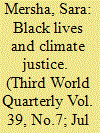

|
|
|
|
|
| Summary/Abstract |
This article shares examples of the leadership of Black communities and social movements in the struggle for climate justice, in four different parts of the world: resisting extraction and promoting community health in Nigeria; addressing extreme climate impacts and building people’s sovereignty in Haiti; confronting repression, defending territory and Mother Earth in Honduras; and cultivating community control and building a land-based movement in the US. Together, these examples have rich lessons to share around the importance of linking climate justice with racial justice; of combining strategies of resistance with those of creating alternative models; of maintaining focus on Black communities’ connections with land, territory and Mother Earth; of recognising and creating space for women’s leadership; and of intersectionality across geography and sector.
|
|
|
|
|
|
|
|
|
|
|
|
|
|
|
|
| 2 |
ID:
152077
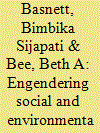

|
|
|
|
|
| Summary/Abstract |
Drawing on feminist and development literature, this paper suggests several important lessons and considerations for building equitable approaches to REDD+. Specifically, we illustrate the conceptual and practical significance of women’s participation for achieving the goals of REDD+as well as the limits and opportunities for gendering participation in REDD+. We argue that the standing debates over how and in what context gender becomes instrumentalised, technicalised or institutionalised in development provide important cautionary tales for the implementation and reporting of REDD+safeguards. By doing so, this paper contributes to the growing literature on gender, development, natural resource management and REDD+.
|
|
|
|
|
|
|
|
|
|
|
|
|
|
|
|
| 3 |
ID:
153141
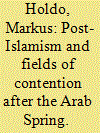

|
|
|
|
|
| Summary/Abstract |
In the aftermath of the Arab Spring, conflicts in Egypt and Tunisia over the authority to rule and the role of religion in society raised questions about these societies’ capacity for reconciling differences. In retrospect, the conflicts also raise questions about the theoretical tools used to analyse regional developments. In particular, the ‘post-Islamism’ thesis has significantly changed the debates on ‘Islam and democracy’ by bringing to light the changing opportunity structures, and changed goals, of Islamist movements. However, this paper argues that the theory underestimates differences within post-Islamist societies. Drawing on field theory, the paper shows how the actual content of post-Islamism is contingent on political struggle. It focuses on three fields whose political roles have been underestimated or misrepresented by post-Islamist theorists: Islamic feminism, Salafist-jihadism and the revolutionary youth. Their respective forms of capital – sources of legitimacy and social recognition – give important clues for understanding the stakes of the conflicts after the Arab Spring.
|
|
|
|
|
|
|
|
|
|
|
|
|
|
|
|
| 4 |
ID:
158646
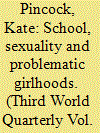

|
|
|
|
|
| Summary/Abstract |
This paper draws on ethnographic research with teenage schoolgirls in Tanzania to explore the impact of education on their experiences of sexual agency and empowerment. School-based education is frequently presented within international development as a route for empowering girls to exercise agency over their sexuality; yet school itself often constitutes a space in which the same restrictive gendered and sexual norms that exist outside the classroom are reproduced or go unchallenged by those working with girls. Despite the constraints to their agency from both outside and within school, girls themselves do resist the narratives of girlhood and sexuality imposed upon them. Recognising how these dynamics challenge our understanding of sexual empowerment is key to finding ways to support girls in navigating repressive norms beyond the classroom.
|
|
|
|
|
|
|
|
|
|
|
|
|
|
|
|
| 5 |
ID:
143577
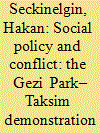

|
|
|
|
|
| Summary/Abstract |
This article argues that conflicts are productive forces within which new ideas are developed and new social relations are articulated. The critical issue here is the way in which such conflicts are managed and mediated. The paper analyses the Gezi Events of May–June 2013 in Istanbul and considers the way in which people’s reactions in these events are linked with the intersection of everyday lives and the Justice and Development Party (Adalet ve Kalkinma Partisi – AKP) government’s social policy initiatives, which are increasingly framing these everyday lives. Social policy is considered to be the domain of this intersection, as the government uses policies to inform a particular way of orienting individuals’ everyday
|
|
|
|
|
|
|
|
|
|
|
|
|
|
|
|
| 6 |
ID:
171924
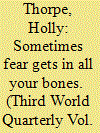

|
|
|
|
|
| Summary/Abstract |
In the context of increasing risk for aid workers, a growing body of scholarship is focused on risk management in contexts of humanitarian assistance and development work. Much less attention, however, has been given to how staff and volunteers experience such risks. This paper adopts a feminist geographical approach to explore how development workers make meaning of risk in specific contexts. Adopting a qualitative approach, it draws upon 14 semi-structured in-depth interviews with international (7) and local (7) staff of an international educational and sporting non-governmental organisation (NGO) in Afghanistan. After exploring differences between local and foreign staff perceptions of risk, it also offers a gendered analysis of risk for women development workers in Afghanistan. In so doing, this paper contributes to the growing body of literature in ‘Aidland’ studies by revealing the complex understandings of risk and fear by both foreign and local staff in the same geographical and organisational context. For NGOs seeking to make life-saving decisions based on the calculation of risk, this paper evidences the need to also create space for the voices of local and foreign staff whose experiences of risk will be highly relational, embodied, gendered and context specific.
|
|
|
|
|
|
|
|
|
|
|
|
|
|
|
|
| 7 |
ID:
149437
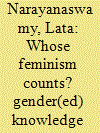

|
|
|
|
|
| Summary/Abstract |
Gender and development (GAD) has become a transnational discourse and has, as a result, generated its own elite elements. This elitism has tended to be attributed to a Northern hegemony in how feminism has been articulated and then subsequently professionalised and bureaucratised. What has received less attention, and what this paper highlights empirically, is how Southern-based feminisms might themselves be sites of discursive exclusion. The paper interrogates these concerns through an analysis of how professionalisation is evidenced in feminist engagement among civil society organisations working on gender in New Delhi. The analysis suggests that efforts to create spaces for subaltern voices are constrained not only by the disciplining effects of neoliberal frameworks but also – and in tandem – by Southern elite feminist priorities. The implications of these findings are significant: processes of professionalisation and the elitism they engender may have the effect of potentially precluding the engagement of those people on the margins whose voices are so sought after as part of efforts to facilitate inclusive development.
|
|
|
|
|
|
|
|
|
|
|
|
|
|
|
|